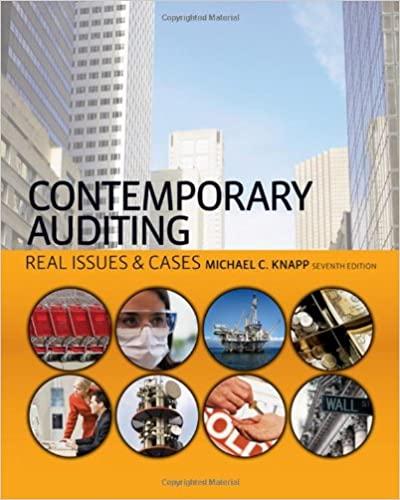Answered step by step
Verified Expert Solution
Question
1 Approved Answer
Please answer both questions. i have no other left... thanks. Tiger Furnishings produces two models of cabinets for home theater components, the Basic and the






Please answer both questions. i have no other left... thanks.
Tiger Furnishings produces two models of cabinets for home theater components, the Basic and the Dominator. Data on operations and costs for March follow: Units produced Machine-hours Direct labor-hours Direct materials costs Direct labor costs Manufacturing overhead costs Total costs Basic 1,380 3,200 2,500 $13,000 65,000 Dominator 330 2,800 3,200 $ 4,550 35,000 Total 1,710 6,000 5,700 $ 17,550 100,000 181,700 $299, 250 Tiger Furnishings's CFO believes that a two-stage cost allocation system would give managers better cost information. She asks the company's cost accountant to analyze the accounts and assign overhead costs to two pools: overhead related to direct labor cost and overhead related to machine-hours. The analysis of overhead accounts by the cost accountant follows: Manufacturing Overhead Utilities Supplies Training Supervision Machine depreciation Plant depreciation Miscellaneous Overhead Estimate $ 1,700 4,200 8,400 23,800 27,000 25,300 91,300 Cost Pool Assignment Machine-hour related Direct labor cost related Direct labor cost related Direct labor cost related Machine-hour related Machine-hour related Direct labor cost related Required: b. Compute the product costs per unit assuming that Tiger Furnishings uses direct labor costs and machine-hours to allocate overhead to the products. (Do not round intermediate calculations. Round your final answers to the nearest whole number.) Basic Dominator Total 13,000 65,000 4,550 35,000 Product Costing Direct material Direct labor Overhead Machine-related Labor-related Total overhead Total cost Units produced Unit cost 0 $ 0 $ $ 0 $ 39,550 $ 78,000 $ 0 I don't understand this. Last year [year 1), we decided to drop our highest-end Red model and only produce the Yellow and Green models, because the cost system indicated we were losing money on Red. Now, looking at the preliminary numbers, our profit is actually lower than last year and it looks like Yellow has become a money loser, even though our prices, volumes, and direct costs are the same. Can someone please explain this to me and maybe help me decide what to do next year? Robert Dolan President & CEO Dolan Products Dolan Products is a small, family-owned audio component manufacturer. Several years ago, the company decided to concentrate on only three models, which were sold under many brand names to electronic retailers and mass-market discount stores. For internal purposes, the company uses the product names Red, Yellow, and Green to refer to the three components. Data on the three models and selected costs follow. Total 45,000 Year 1 Units produced and sold Sales price per unit Direct materials cost per unit Direct labor-hours per unit Wage rate per hour Total manufacturing overhead Red 9,000 $ 145 $ 75 2 $ 17 Yellow 14,000 $107 $ 65 1 $ 17 Green 22,000 $ 75 $ 45 0.5 $ 17 $946,000 This year (year 2), the company only produced the Yellow and Green models. Total overhead was $662,500. All other volumes, unit prices, costs, and direct labor usage were the same as in year 1. The product cost system at Dolan Products allocates manufacturing overhead based on direct labor-hours. Activator Required: a. Compute the product costs and gross margins (revenue less cost of goods sold) for the three products and total gross profit (loss) for year 1. b. Compute the product costs and gross margins (revenue less cost of goods sold) for the two remaining products and total gross profit (loss) for year 2 c. Should Dolan Products drop Yellow for year 3? Complete this question by entering your answers in the tabs below. Required A Required B Required C Compute the product costs and gross margins (revenue less cost of goods sold) for the three products and total gross profit (loss) for year 1. (Do not round intermediate calculations. Negative amounts should be indicated by a minus sign. Round your answers to 2 decimal places.) Red Yellow Green Total Product cost per unit Gross margin (loss) per unit Total gross profit (loss) ..Actuato Complete this question by entering your answers in the tabs below. Required A Required B Required Compute the product costs and gross margins (revenue less cost of goods sold) for the two remaining products and total gross profit (loss) for year 2. (Do not round your intermediate calculations. Negative amounts should be indicated by a minus sign. Round your answers to 2 decimal places.). Yellow Green Total Product cost per unit Gross margin (loss) per unit Total gross profit (loss) Activa Complete this question by entering your answers in the tabs below. Required A Required B Required Should Dolan Products drop Yellow for year 3? Yes NoStep by Step Solution
There are 3 Steps involved in it
Step: 1

Get Instant Access to Expert-Tailored Solutions
See step-by-step solutions with expert insights and AI powered tools for academic success
Step: 2

Step: 3

Ace Your Homework with AI
Get the answers you need in no time with our AI-driven, step-by-step assistance
Get Started


